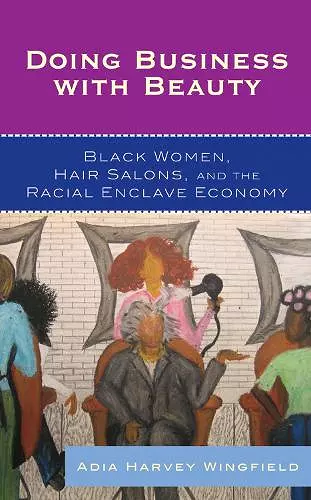Doing Business With Beauty
Black Women, Hair Salons, and the Racial Enclave Economy
Format:Paperback
Publisher:Rowman & Littlefield
Published:15th Jul '09
Currently unavailable, and unfortunately no date known when it will be back
This paperback is available in another edition too:
- Hardback£92.00(9780742561168)

Black women comprise one of the fastest-growing groups of business owners in the United States. In Doing Business with Beauty, sociologist Adia Harvey Wingfield examines this often-overlooked group and one of the most popular businesses run by these entrepreneurs: hair salons. Using in-depth interviews with hair salon owners, Doing Business with Beauty explores several facets of the business of owning a hair salon, including the process of becoming an owner, the dynamics of the owner-employee relationship, and the factors that steer black women to work in the hair industry. Through Harvey Wingfield's research we can understand the black female business owner's struggle for autonomy and her success in entrepreneurship.
'Getting their hair done' is an intimate experience of Black womanhood across ages and economic classes. Black woman-owned salons are the site of sisterhood, solidarity and competitive struggle. This unique ethnography skillfully reveals the contradictions of financial success despite and because of systemic gendered racism. Doing Business with Beauty is a timely book, a great read for readers from business schools to the social sciences. -- Philomena Essed, Leadership and Change Program, Antioch University
In this beautifully written ethnographic book, Adia Harvey Wingfield delves into the world of black women beauty salons. Wingfield uses the 'racial enclave economy' rather than the 'ethnic enclave economy' to emphasize the experiences with gendered racism among black salon owners, stylists and customers. This book is a significant contribution not only to the ethnic entrepreneurship literature that has almost ignored black businesses, but also to race-gender intersection studies and African American studies. -- Pyong Gap Min, Queens College and the Graduate Center, CUNY
Doing Business with Beauty is a much-needed corrective to the glaring absence of Black women within the history of American entrepreneurship. In clear, concise prose, Adia Harvey Wingfield's much needed insight makes clear that hair matters in America. -- Noliwe Rooks, Princeton University
Wingfield offers a welcome analysis of a woefully under-studied topic. . . . Recommended. * CHOICE *
Wingfield has made a significant contribution to the scholarship on black women's beauty industry. She has produced a well-organized, readable, informative and insightful book. It should be read by scholars and general readers interested in gender, race, and class issues, and specifically ethnic enclaves studies. -- Elaine Bell Kaplan * Contemporary Sociology *
Doing Business with Beauty develops a new approach to Black women's self employment as it reveals the continued importance of the industry that produced Madame C.J. Walker, the first African American millionaire. Based on historical sources, social science theory and sensitive ethnographic research, it will satisfy both scholars and general readers interested in African American studies, women's studies and minority entrepreneurship. -- Steven J. Gold, co-author of Ethnic Economies
Apart from the pioneer entrepreneurs like Madam C. J. Walker, who made a fortune inventing and selling hair products to black women, little has been said about the many black women who own and run beauty salons throughout America. Wingfield has interviewed twenty-three such women. They are of different ages and from different locations but all are from working class backgrounds. The thread that unites them is their determination to own their own business and their choice of specializing in the care of other black women. The stories are compelling enough but Wingfield puts them within the context of gendered racism. The salon is often a haven for clients but it can also help foster the subliminal racism that makes some African-American women feel that they must straighten their hair to be beautiful. Wingfield discusses attitudes within these ethnic enclaves and also the experiences of immigrant black women in the same profession. Her obvious respect for her subjects is refreshing and gives them the chance to shine in their own light. * Reference and Research Book News *
In Doing Business With Beauty, Adia Harvey Wingfield effectively argues that the middle-man and ethnic enclave theories of entrepreneurship applied to ethnic minorities fail to capture the systemic nature of racism on the entrepreneurial experiences of Black women. In fact, argues Wingfield, dominant entrepreneurial theories err in that theorists conflate race and ethnicity in analyses of entrepreneurial activities among minorities, thereby rendering invisible the effects of structural racism on self-employed Blacks… This work contributes immensely to research on entrepreneurship in general and research on racial and ethnic minority entrepreneurship in particular. Wingfield's well-written text stands alongside the very best in gender studies that illustrate how race, gender, and class shape women's work experiences. -- Ingrid Banks, University of California, Santa Barbara * Work and Occupations *
ISBN: 9780742561175
Dimensions: 232mm x 156mm x 13mm
Weight: 272g
176 pages